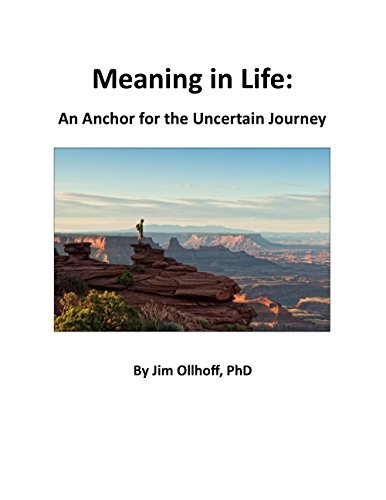Meaning in Life: An Anchor for the Uncertain Journey
Booklet Description
Purpose in life is one of the primary indicators of mental health. This is life meaning, the purpose in life, the thing that makes us get up in the morning. People who have meaning in their lives tend to thrive in virtually any circumstances. Those who live with a passion for something can survive almost anything. Here’s what we know (and don’t know) about it.
-
Dr. William Ritter, 1856–1944
Why on earth are we here on Earth?
Where do we find meaning?
The psychological meaning of meaning
What meaning-making does for us
Dimensions of meaning
So how, exactly, do we search for meaning?
When meaning goes bad
Stuff we don’t know
Conclusions
References
-
Why on earth are we here on Earth?
So what about the rest of us? What’s the point of existing? We’re on this journey called life, but why? As we walk through life, what is our purpose? Are we here simply to eat food and die at the end of the journey? Are we here on Earth simply to take up natural resources?
We solve this nagging, thorny question by constructing meaning for ourselves. We work to believe that we are here for a reason—that we have a mission in life. We are not here just to use up oxygen, but we have a purpose for being here. Humans work—and work hard—to make meaning of their lives and make sense of their experiences.
Why do I get up in the morning? What is my purpose in life? What will my legacy be? Do my choices in life reflect some larger, consistent plan? What does my life mean? This meaning gives us significance and purpose. We hate Macbeth’s idea that life is “a tale told by an idiot, full of sound and fury, signifying nothing.” So instead, we construct meaning for ourselves. We need to know that somehow, some way, our lives matter for something.
Perhaps the first in-depth psychological study of meaning began in 1946 with Victor Frankl’s book, Man’s Search for Meaning. Frankl said that even in the worst possible circumstances, people strove to find meaning in their lives. And he knew about the worst possible circumstances—he was a Holocaust survivor during World War II. His imprisonment at the Nazi death camps allowed him to see how some people psychologically survived and others did not. Those who had meaning—giving someone else their crust of bread, or holding out hope to see their family again—gave strength in the worst imaginable conditions.
Mascaro and Rosen (2008) define meaning as “Possession of a coherent framework for viewing life that provides a sense of purpose or direction, which… can bring about a sense of fulfillment” (p. 579). Their point is that meaning is more than just a bunch of goals. It is a way of seeing life, a filter for all your experiences. It is the color of the lenses through which you see your purpose as well as the day-to-day experiences. Meaning is essentially a road map for life.
Here’s a few principles about meaning:
Meaning gives us direction. When we have meaning, we have a better sense of what our goals are. When we are confronted with the buffet of choices that life gives us, we have fewer options to sort through. We have goals that make sense in the larger fabric of our life.
Meaning gives us identity. Meaning is always woven into our self-identity, and central to the way that we tell stories about ourselves. Purpose is so central to our being, that it is inseparable from who we are. When we devote effort and make progress toward life goals, it provides a significant and renewable source of engagement and meaning (McKnight & Kashdan, 2009).
Meaning gives us an anchor. Michael Steger (2013) talks about meaning as being an anchor that we throw into the future. That anchor gives us stability. When times are difficult now, that anchor gives us hope that we can endure today because of the better times tomorrow. It is easier to cope with the daily stresses and irritations of life, because we are anchored to a larger purpose.
A lack of meaning is problematic. When people have no meaning in their lives, they struggle to make it through the day. They are typically aimless and directionless, and they suffer a gnawing boredom or restless frustration because they are not sure what is going to happen to them next. People without meaning often resort to alcohol, medication, or illicit drugs to mask the pain of their lack of direction.
Meaning and happiness are not the same. Some people can have happiness (at least temporarily) without meaning. And others can have meaning without happiness. Some of the people with the deepest meaning are those who have struggled the most.
